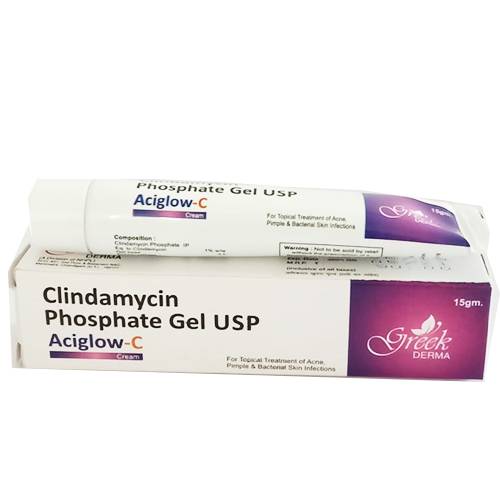- Home
- DERMA PRODUCTS
- Clindamycin Phosphate Gel

Clindamycin Phosphate Gel
ACIGLOW-C
Enquiry about Clindamycin Phosphate Gel

A topical drug called clindamycin phosphate gel is used to treat skin infections and acne. It has clindamycin, an antibiotic that prevents the growth of microorganisms. The gel is applied directly to the problematic area, where it helps to clear up pimples and stop further outbreaks by reducing inflammation and getting rid of the bacteria that cause acne. It is crucial to adhere to the doctor’s recommendations for application frequency and time. Irritation, redness, and dryness of the skin are examples of frequent adverse effects. A popular and efficient therapy option for mild to moderate acne and bacterial skin infections is clindamycin phosphate gel.
Benefits of Using Clindamycin Phosphate Gel
Clindamycin Phosphate Gel has a number of advantages for the treatment of bacterial skin infections and acne. First of all, it efficiently hunts down and eradicates germs that cause acne, lowering inflammation and enhancing skin quality. It promotes smoother, healthier skin by helping to get rid of pimples that are already present and preventing the development of new ones. The topical use of the gel enables direct and focused treatment, reducing the risk of adverse systemic consequences. Clindamycin Phosphate Gel is also generally well tolerated and appropriate for a range of skin types. It offers a practical option for treating mild to moderate acne and associated issues, making it a favorite with dermatologists and patients alike.
How to Use Clindamycin Phosphate Gel
For best results, use Clindamycin Phosphate Gel as directed. Thoroughly wash and dry the area of skin that is affected. While avoiding the eyes, lips, and damaged skin, dab a small amount of the gel onto the afflicted region. To spread the gel carefully, use clean fingertips. Wash your hands after using. Use it as your healthcare professional instructs, typically once or twice daily. Use it only as directed; do not apply more or use it more frequently. Be patient because it can take a few weeks before you see results. Reduce usage or stop altogether if irritation develops, and talk to your doctor about possible alternative therapies.
How Clindamycin Phosphate Gel Works
Clindamycin Phosphate Gel functions by preventing the growth of germs, concentrating on the bacteria that cause acne and skin infections. An antibiotic in the gel called clindamycin disrupts the production of proteins by bacteria, which stops them from proliferating and spreading. It consequently lessens acne-related inflammation, redness, and swelling, aiding in the healing of current lesions and halting the development of new ones. The topical application enables direct action at the injection site, making it a localized therapy approach that is efficient and has few systemic side effects.
Precautions While Using Clindamycin Phosphate Gel
It’s crucial to follow a few guidelines when using Clindamycin Phosphate Gel to ensure a secure and productive course of treatment. Keep your distance from your mouth, eyes, and mucous membranes. In the event of accidental contact, thoroughly rinse with water. Use the gel sparingly on skin that is inflamed, sunburned, or broken. Unless your doctor specifically instructs you otherwise, avoid using other acne treatments concurrently. To avoid developing increased sensitivity to sunlight, limit your time in the sun and wear sunscreen. If you experience any adverse reactions or severe skin rashes, stop using the product and call your doctor. To prevent any interactions or negative effects, be sure to let your healthcare professional know about any medical problems or prescriptions. To achieve the best outcomes, strictly adhere to your doctor’s directions.



